BEST RECORDINGS OF THE PAST TWENTY YEARS: Our reviewing panel selects the best recordings of the past twenty years.
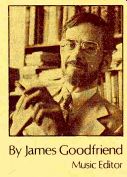
By James Goodfriend, Music Editor
TWENTY years is a long time in a field as young as that of recorded mu sic. The last twenty-year span has been especially long if we measure it not by simple chronology but by the comparative density of events and accomplishments, for this is the stereo era and new developments are virtually a daily occurrence. To those who first became acquainted with recorded music and playback equipment during this time, the conditions that have prevailed-the high quality of recorded sound, the easy availability of vast quantities of repertoire, the extreme range of choice available to the consumer-must seem to be the invariable norm. I can assure them it is not--even going back, for comparison, only to what I personally remember. I will not bore the reader with the record-collecting reminiscences of an old man of forty-five, but I would like to point out that I, and we, ave for the last twenty years been living through a sort of golden age of recorded music.
It is no accident that the founding of STEREO REVIEW (originallycalled Hi Fi & Music Review), exactly twenty years ago this month, essentially coincided with the beginning of the stereo era. Though there were no stereo records to review in that first issue, excitement about the new medium was evident throughout the magazine. Stereo tapes were discussed, as was the forthcoming showdown between the two--or three--proposed systems of stereo disc recording.
A projection was made that he first commercial stereo record release should be expected in two years, but reality, as it so often does, made the prediction I ok timid: the first reviews of stereo discs appeared in the magazine before the year was out. IN the last twenty years records have come and records have gone, and the quantity, on both neap and ebb tides, has been enormous. No one any longer remembers all the records. No one any longer remembers even all the high points: As a to at the memory for our older readers, and s a sort of guide to the riches for the younger ones, we have asked certain of our staff and contributing editors to select what, in specific areas of the repertoire, seem to them to be the out standing records of the past twenty years, and to add a brief comment on each one of them. For reasons more of space than any thing else, a rather arbitrary figure of eight records was decided upon. To keep us from waxing too sentimental about the past (recent as it may be), however, and to remind both readers and ourselves that we are at least as concerned about the future, as we are about the past, we also asked everyone to cast a couple of votes for the best records of the next twenty years-purely hypothetical at this point, of course. And so you will see at the foot of each editor's contribution a little "Two for the Future," suggesting a couple of discs, in fun or in earnest, that might garner accolades similar to the first eight if only someone had the wit to make them. Record companies are invited--please--to copy, of course, but the basic point is that everything hasn't been done yet, not even everything that ought to be done.
We have tried to limit selection to records that were actually recorded within the last twenty years, but we have bent a little for re cords that were first released within that time, and once even for a record of selections that were first collected on an LP (so far as we can tell) within that time. There comes a point when one just has to say, "Oh the hell with it, put it in." We have also tried to keep the categories themselves relatively discrete, but some records don't categorize easily, and sometimes we've even let people jump lanes. And we have all tried not to balance things out neatly and artificially, but to select on the basis of real and personal value the records that knocked us out and still do. We ask the reader not to take categories and time too seriously but to dwell, rather, on the records themselves. There is ample room for disagreement as to choice, but any score of years that produced the records listed below had a lot going for it. Will we be able to say as much for the next twenty?
BEST RECORDINGS OF THE PAST TWENTY YEARS
Orchestral Music
By David Hall
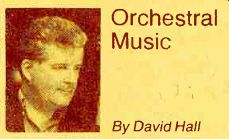
BARTOK: Concerto for Orchestra. New York Philharmonic, Pierre Boulez cond. COLUMBIA M-32132. Boulez's reading, the New York Philharmonic’s playing, and Columbia's recording combine to produce a tour de force.
BEETHOVEN: Symphony No. 3, in E-flat Major, Op. 55 ("Eroica"). NBC Symphony Orchestra, Arturo Toscanini cond. RCA VICS 1655E (the original mono LM 2387 or import counterpart is recommended). Still the most masterly reading of the Eroica in terms of gripping drama and classic discipline.
ELGAR: Symphony No. 2, in E-flat Major, Op. 63. London Philharmonic Orchestra, Sir Adrian Boult cond. ANGEL S-37218. Elgar's impassioned and elegiac masterpiece has found its ideal interpreter and sonic realization.
IVES: Symphony No. 4. American Sym phony Orchestra, Leopold Stokowski cond. COLUMBIA MS-6775. There may be more accurate renditions, but this "creator's" re cording still has all the spirit.
MAHLER: Symphony No. 9, in D Major. Columbia Symphony Orchestra, Bruno Walter cond. ODYSSEY Y-30308. Walter and this delectable music were made for each other; the slow movement says it all.
SCHOENBERG: Variations for Orchestra, Op. 31; Verklarte Nacht, Op. 4. Berlin Philharmonic Orchestra, Herbert von Karajan cond. DEUTSCHE GRAMMOPHON 2530 627. Karajan makes the formidable variations sound as clean as Mozart, and immensely dramatic in the bargain.
SCHUBERT: Symphony No. 9, in C Major ("The Great"). Philadelphia Orchestra, Arturo Toscanini cond. Presently avail able in RCA collection CRMS 1900. A remarkable restoration of a-remarkable performance (at one time it had been given up as unsalvageable).
STRAVINSKY: Le Sacre du Printemps. Columbia Symphony Orchestra, Igor Stravinsky cond. COLUMBIA MS-6319 or M-31830. The Old Master knew his own music better than anyone; this is the best of his three recorded documentations.
TWO FOR THE FUTURE
MOZART: Symphonies Nos. 35, 36, 38, 39, 40, 41. Vienna Philharmonic Orchestra, Carlos Kleiber cond. I'd like all the last six, but if it has to be only one, let it be No. 40, in G Minor.
SHOSTAKOVICH: Symphonies Nos. 1-15. Leningrad Philharmonic Orchestra, Maxim Shostakovich cond. Judging from what he accomplished with the Fifth Sym phony, the composer's son should tackle the whole cycle.
ROCK
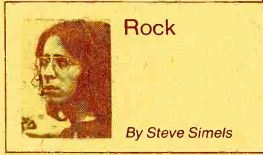
CHUCK BERRY: Chuck Berry's Golden Decade. CHESS 15140. To this day, as Bob
Seger put it, all Chuck's children are out there playing his licks-even the
Sex Pistols.
THE BEACH BOYS: Pet Sounds. WARNER BROS. MS-2083. Adolescent romantic traumas raised almost to the level of High Art by Brian Wilson, rock's most sophisticated primitive.
THE BEATLES. CAPITOL SWBO-101. Rock eclecticism defined; for melodic rich ness and studio mastery this one remains unsurpassed.
DEREK AND THE DOMINOES: Layla (and Other Love Songs). POLYDOR 3501. Eric Clapton's anguished exorcism of his demon-and the most moving guitar rock of the decade.
BOB DYLAN: Blonde on Blonde. CO LUMBIA C2S-841. The Sixties . . . through a glass, darkly.
THE ROLLING STONES. LONDON LL 3375. Heavy-metal clatter, amphetamine energy, and the Chicago Blues add up to rock and-roll in what is still the most potent debut album ever made.
THE ROLLING STONES: Exile on Main Street.
ROLLING STONE$ COC-2-2900. A night of fear, haunted and brilliant; the Stones still playing the blues, only this time their own.
BRUCE SPRINGSTEEN: Born to Run. COLUMBIA PC-33795. The rock album as Homeric epic; stately, impassioned, and altogether grand-Springsteen's best so far.
TWO FOR THE FUTURE
JOHNNY ROTTEN: Johnny Rotten Is Nauseous (Over Lennon and McCartney).
The Sex Pistols' volatile lead singer recorded while retching on a pile of his older sister's Beatle albums.
YOKO ONO: Retirement (One Performance Only). The noted conceptual artist and shrike performs a long overdue Public Service. On the Sino-Poetica label.
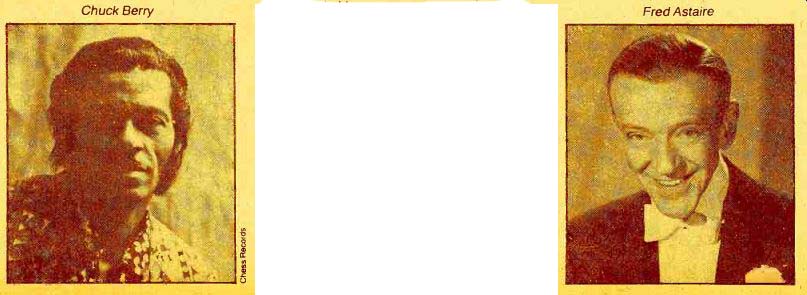
MOR
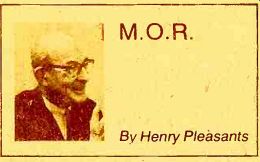
BING CROSBY: At My Time of Life.
UNITED ARTISTS ( England) UAS 29956. The old groaner in his early seventies remembering some golden oldies and singing, to my ears, better than at any other time of his life.
FRED ASTAIRE: They Can't Take These Away from Me. UNITED ARTISTS ( England) UAS 29941. Made, as was the Bing Crosby album above, in London in the summer of 1975, it is the album that persuaded me that Fred was not a dancer who sang, but a singer who danced.
FRANK SINATRA: Only the Lonely.
CAPITOLSM 1053. Harold Arlen and Johnny Mercer, among others, providing Frank with just the material he needs to show how a sad tale should be told in song.
JIM BAILEY. UNITED ARTISTS ( England) UAS 5642. The female impersonator sounding more like Peggy Lee, Barbra Streisand, and Judy Garland than they sometimes do themselves.
BARBRA STREISAND: Barbra Joan Streisand. COLUMBIA PC 30792. Barbra with gospel-style backings and singing, on John Lennon's Mother, as though out to show Aretha Franklin how it should be done.
CLEO LAINE: Cleo Live at Carnegie Fred Astaire Hall. RCA LPL1-5015. Memorable if only for Cleo's unaccompanied opening with I Know Where I'm Going and made unforgettable by her way with Michel Legrand's You Must Believe in Spring.
WILLIE MAE FORD SMITH: I Believe I'll Run On. NASHBORO 7124. Not quite in my category, but I can't resist this, her only album, made when she was sixty-seven.
This is the lady to whom Mahalia Jackson once said, "Willie Mae, I'm gonna give up this beauty shop and sing like you." And she did.
JACK JONES: All to Yourself. RCA ( England) TVL 43002. The most recent al bum by the man who is, to my ears, completely in a class by himself as a vocalist.
TWO FOR THE FUTURE
GLADYS KNIGHT: Gladys Without the Pips. Nothing against the Pips, you under stand, but Gladys, like malt whisky, should be savored neat.
JACK JONES: Jack Jones Sings Harold Arlen. Jack, at last, with material worthy of his gifts. Jazz By Chris Albertson
JAZZCIRCLE: Circle in Paris. ECM 1018/19. Anthony Braxton, Chick Corea, Dave Holland, and Barry Altschul-a formidable quartet that blossomed in Europe, where the ground seems to be increasingly fertile.
ORNETTE COLEMAN DOUBLE QUARTET: Free Jazz. ATLANTIC SD-1364. An off shoot; some thought it a weed, but Cole man's music turned out to be a beautiful wildflower that blossoms still.
JOHN COLTRANE QUARTET: Giant Steps. ATLANTIC SD-1311. We had seen the sprout, and here we behold the budding flower that was John Coltrane.
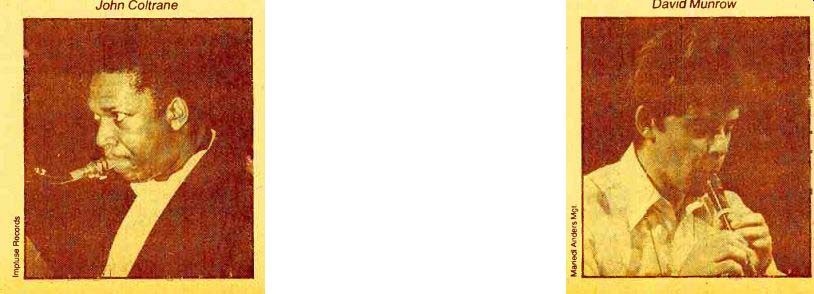
John Coltrane
JOHN COLTRANE QUARTET: A Love Supreme. IMPULSE S-77. Coltrane in full bloom, but ever giving off new, intoxicating fragrances.
MILES DAVIS/GIL EVANS: Sketches of Spain. COLUMBIA CS-8271. In which Davis and Evans reached the peak of perfection, fulfilling the promises they made with their "Porgy and Bess" album.
MILES DAVIS SEXTET: Kind of Blue. COLUMBIA CS-8163. With John Coltrane and Bill Evans on hand, this album opened an important door to a sound that was as intellectually stimulating as it was soulful.
KEITH JARRETT: The Koln Concert. ECM 1064/65. His "Solo Concerts-Bremen/Lausanne" was a major achievement in improvisational art, but Jarrett exceeded himself in Kan.
SONNY ROLLINS QUARTET: The Bridge. RCA APL1-0859. It is awesome, and even though, alas, it led nowhere, it still stands as a magnificent structure.
TWO FOR THE FUTURE
MILES DAVIS AND McCOY TYNER: The Davis/Tyner Duets. Davis shakes off the last drops of bitches' brew and unplugs his electronic attachments for a series of duets with pianist McCoy Tyner, recorded with ECM excellence.
GEORGE RUSSELL ORCHESTRA: The Music of Mingus, Monk, and Ellington. Jazz classics virtually rewritten by Russell, a brilliant arranger whose innovative style has yet to be fully appreciated by any but a few listeners.
Early Music
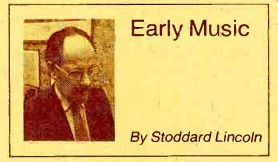
THE ART OF COURTLY LOVE. Early Music Consort of London, David Munrow cond. SERAPHIM SIC-6092. The French repertoire from Machaut through the Burgundian School is brought to vivid life through great performances of its subtle settings of great poetry.
CANT! AMIOROSI. Nigel Rogers (tenor). DEUTSCHE GRAMMOPHON ARCHIV 2533 305.
By far the best recording ever of early seventeenth-century Italian monody by Caccini and his circle.
GABRIELI AND HIS CONTEMPORARIES. Schola Cantorum Basiliensis, August Wenzinger cond. DEUTSCHE GRAMMOPHON ARCHIV 73154. One of the first-and best records in which ancient instruments are played flawlessly; it also brings out the delightful spaciousness of the Venetian acoustical setup.
HANDEL: Alcina. Joan Sutherland, Graziella Sciutti, and Mirelia Freni (sopranos); Teresa Berganza (mezzo-soprano); Monica Sinclair (contralto); Luigi Alva (tenor); Ezio Flagello (bass); London Symphony Chorus and Orchestra, Richard Bonynge cond. LONDON OSA-1361. This relatively early record of a complete Handel opera has a truly great operatic cast singing with musicological guidance; it proves that a Handel opera can stand on its own feet without being crowned a "historical event."
MADRIGAL MASTERPIECES. Deller Consort. VANGUARD BACH GUILD BGS 5031 and 5051.. One of the most comprehensive collections of Italian and English madrigals and French chansons, it is also superbly performed.
MONTEVERDI: Vespro della Beate Vergine (1610). Monteverdi Chorus of Hamburg; Concenl US Musicus of Vienna, Jurgen Jurgens cond. TELEFUNKEN SWAT 9501/02-A. Early instruments, a boys' choir, and excellent soloists together produce sumptuous Baroque sonorities that really send this masterpiece sky-high.
RAMEAU: Les Indes Galantes. Soloists; Ensemble Vocal Raphael Passequet; La Grande Ecurie et La Chambre du Roy, Jean-Claude Malgoire cond. COLUMBIA M3-32973. A truly remarkable reconstruction of a luscious work, beautifully sung here to the exotic accompaniment of early instruments.
VIVALDI: The Four Seasons. Simon Standage (Baroque violin); English Concert, Trevor Pinnock cond. CRD 1025. This brilliant performance on original instruments at low pitch sheds new light on an old treasure.
TWO FOR THE FUTURE
LULLY: Amadis de Gaul. Janet Baker; Robert White; English Concert, Trevor Pinnock cond. A grand opera by the grandest of opera composers needs authenticity, style, expertise--and real singers.
BLITHEMAN: Gloria Tibi Trinitas (and other organ works from The Mulliner Book). Helmut Walcha (organ). Marvelously fascinating music-and yet no one has recorded it. -David Munrow
Solo Repertoire
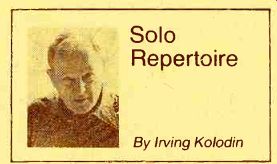
BEETHOVEN: Sonata in F Minor, Op. 57. Sviatoslav Richter (piano).COLUMBIA ML 272, RCA VICS 1427. A rare concurrence of "live" and recorded efforts by the same performer at the same point in his career (1960), in which the studio effort sweeps forward with the dynamism of the concert hail and the Carnegie Hall performance has all the iron-fisted control of the studio.
BEETHOVEN: Variations on a Theme by Diabelli, Op. 120. Rudolf Serkin (piano). COLUMBIA AML 5246. A concentration, in one towering masterpiece, of the power Ser kin spread throughout his recorded repertoire, 'marshaled to project all the vistas of piano-music-to-come that were imagined by Beethoven.
BRITTEN: Suites for Cello, Opp. 72 and 80. Mstislav Rostropovich (cello). LON DON CS 6617. Unique examples of works created for and recorded by the same extraordinary master; a historic instance of artistic entente.
FALLA: Cuatro Piezas Espaliolas; El Amor Brujo; Three-Cornered Hat (excerpts). Alicia de Larrocha (piano). LONDON Alicia de Larrocha CS 6881. An off-beat instance of the musical riches that accrued to the world by reason of the emergence to high rank of a qualified exponent of the Spanish literature.
KREISLER FAVORITES. Mischa Elman (violin). VANGUARD SRV 367SD (reissue). Unique evidence of stylistic absorption which enabled one legendary instrumentalist to evoke both the compositional and per forming individuality of another.
RAVEL: liaises Nobles et Sentimen tales (also pieces by Poulenc, Faure, and Chabrier). Artur Rubinstein (piano). RCA LSC 2751. A short course in the art of producing a master recording: irresistible material combined with an inimitable performer of it; the engineering isn't bad either.
SATIE: Piano Pieces. Aldo Ciccolini (piano). ANGEL S-36482. This landmark first re lease stretched into a six-volume series that gave the persimmon-like fruit of Satie a popularity hitherto restricted to the plums of the repertoire.
SCHOENBERG: Piano Music, Opp. 11, 19, 25, 33a, 33b. Maurizio Pollini (piano).
DEUTSCHE GRAMMOPHON 2530 531. This venture combines intellectual insight with a seldom-equaled spiritual affinity to make this music more approachable than is commonly the case (even with the best performers).
TWO FOR THE FUTURE
BACH: The Well-Tempered Clavier; The Goldberg Variations; The Partitas. Charles Rosen (piano). To be recorded and released on one digital disc.
YSAYE: Sonatas for Unaccompanied Violin. Mark Kaplan (violin). Kaplan, a young whiz of a fiddler and pupil of Dorothy DeLay, will make his Philadelphia Orchestra debut in April 1978. He deserves to be recorded; so does Ysajie-even again.
PORGY AND BESS (George and Ira Gershwin-Dubose Heyward). RCA ARL3 2109. Whether it's counted as musical comedy, grand opera, "folk opera," or a hybrid of all three, Porgy is Gershwin's master piece, and it has received its finest recording to date with the Houston Grand Opera under John DeMain.
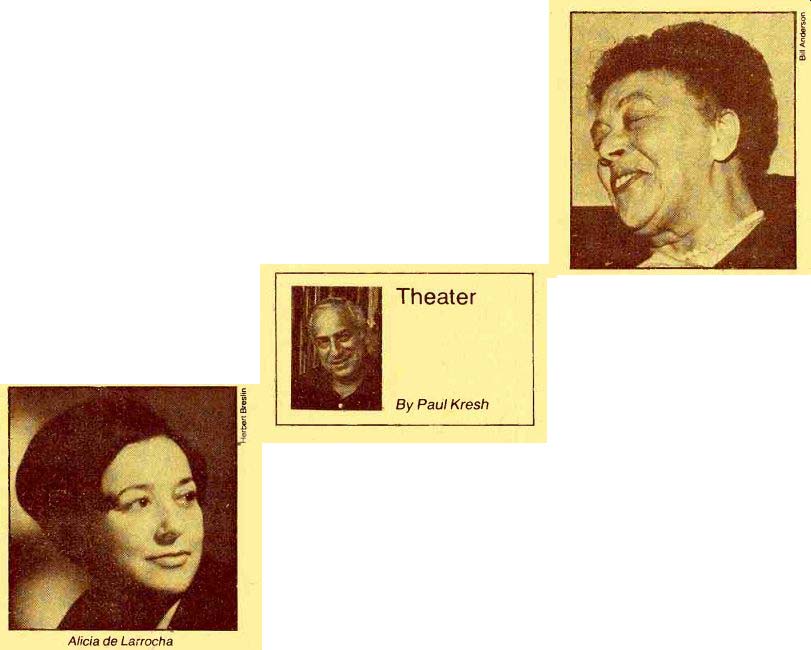
WELLES RAISES KANE (Bernard Herrmann). UNICORN UNS 237. The composer of some of the best-crafted original film scores ever devised conducts a cleverly arranged suite of themes from Citizen Kane and The Magnificent Ambersons, backed by the ingenious music for The Devil and Daniel Webster.
THE BEATLES: Yellow Submarine. APPLE SW-153. The soundtrack created by the Beatles for the hilarious full-length cartoon radiates zany good cheer and perfectly displays the group's legendary style.
THE DECLINE AND FALL OF THE ENTIRE WORLD AS SEEN THROUGH THE EYES OF COLE PORTER. COLUMBIA SPECIAL PRODUCTS CSP COS-2810. Ben Bagley's lighthearted and sparkling "revuesical," made up of un-hackneyed Porter songs, was a hit of the 1965 season in New York and holds up sturdily on disc.
GYPSY (Jule Styne-Stephen Sond helm). COLUMBIA OS 2017. The hit of the 1958-1959 Broadway season starred Ethel Merman at the height of her powers as the stage mother of stripper Gypsy Rose Lee, and this original-cast album faithfully mirrors her astonishing performance.
MABEL MERCER: Midnight at Mabel Mercer's. ATLANTIC 1244. There's never been a cabaret singer with a style more intimate, alluring, or exhilarating, and this recording of almost exactly twenty years ago offers a generous sampling of Mabel's sophisticated repertoire.
ON THE TOWN (Leonard Bernstein-Betty Comden-Adolph Green). COLUMBIA S 31005. Back in the 1960's Bernstein reassembled most of the original cast of his 1944 musical about three sailors on leave in the Big Apple and put together one of the most stimulating and ingratiating musical-comedy albums ever made.
WEILL: Berlin Theater Songs. Lottea Lenya. COLUMBIA MG 30087. The widow of Kurt Weill and the supreme interpreter of his bittersweet ballads puts the skills of her husky, haunting voice at the service of the songs that lent so much distinction to the German musical theater in the days before Hitler.
TWO FOR THE FUTURE
THE BROADWAY MUSICAL. Columbia and RCA pool their resources, ransacking the archives, to produce a six-record survey of highlights from American musical come dies of the twentieth century, starting with Victor Herbert and winding up with excerpts from the original-soundtrack octophonic recording of the stage-musical extravaganza version of Star Wars, with Andrea McArdle of Annie as the Princess. To be released on RCA-COLUMBIA SPECIAL PRODUCTS ARQ SL 2001.
COME TO THE CABARET. An album maybe a multiple set-featuring the smoky voices of all the nightclub ladies in long skirts who have had us weeping into our champagne down through the years, Greta Keller, Mabel Mercer, Julie London, Lotte Lenya, Edith Piaf, Marlene Dietrich, Lena Home, Josephine Baker, and Ethel Waters among them.
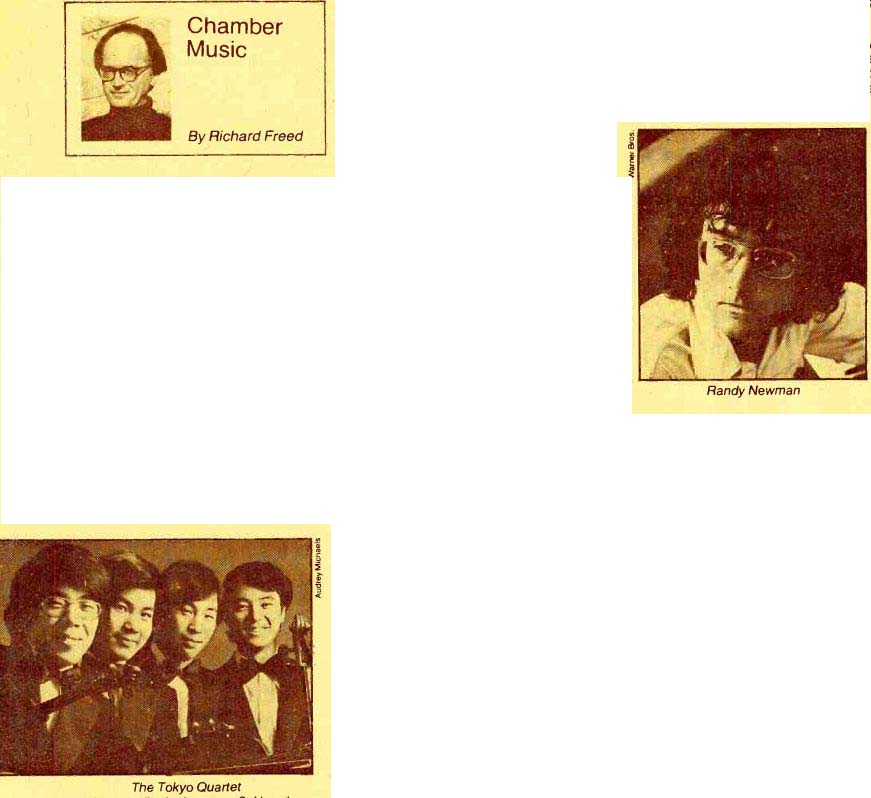
BEETHOVEN: The Five Late Quartets and Grosse Fuge, Opp. 127, 130, 131, 132, 133, 135. Quartetto Italiano. PHILIPS 6707 031. The remarkable Italian ensemble is at its very best in the greatest works written for string quartet, exploring the wonders of their structure with imagination and assurance and yet never overlooking the opportunities for beautiful playing.
DVORAK: String Quartet in G Major, Op. 106. Prague String Quartet. DEUTSCHE GRAMMOPHON 2530 480. "Idiomatic" and yet absolutely unbound by tradition, every thing about this performance is aquiver with the freshness of discovery and an eager ness to share it.
HAYDN: Six Quartets, Op. 50. Tokyo Quartet. DEUTSCHE GRAMMOPHON 2709 060. In terms of style, precision, spirit, tonal beauty, and overall communicativeness, these six sides add up to one of the most nearly perfect string quartet releases ever. The Tokyo Quartet K. Harada, Ikeda, Isomura, S. Harada
THE STRING QUARTET IN THE U.S.A. Vol. 1: Early. Kohon Quartet. Vol. 1900-1950. Kohon Quartet. Vol. Avant-Garde. Concord Quartet. Vox SVBX-5301, SVBX-5305, and SVBX-5306. An intriguing exploration of material hardly known to most listeners-from a piece attributed to Benjamin Franklin through works of Griffes, Chadwick, Piston, Thomson, Schuman, et al. to recent "classics" by Cage, Crumb, Druckman, and their contemporaries. With the single exception of the Koh"ri' deadly treatment of Gershwin's Lullaby, all the performances are first-rate.
MOZART: The Last Ten String Quartets (K. 387, 421, 428, 458, 464, 465, 499, 589, 590). Amadeus Quartet. DEUTSCHE GRAMMOPHON 2720 055. Overall, no other foursome has so successfully digested and projected all ten of these marvelous works, and no other single achievement quite so pointedly displays all the Amadeus' characteristic elegance, grace, and authority.
ROCHBERG: String Quartet No. 3. Concord Quartet. NONESUCH H-71283. Perhaps the most fascinating string quartet (more or less a la Mahler) of the last thirty years, written for the performers who pre sent it with such luminous conviction here.
SCHUBERT: Complete String Quartets. Melos Quartet of Stuttgart. (DEUTSCHE GRAMMOPHON 2740 123. Benefiting from the latest scholarly research as well as fine sound, the Stuttgarters are well "inside" this material, with some fresh but by no means idiosyncratic ideas about it.
SHOSTAKOVICH: String Quartets Nos. 1-11, Opp. 49, 68, 73, 83, 92, 102, 108, 110, 117, 118, 122. Borodin Quartet. SERAPHIM SIC-6034 and SIC-6035. With well nigh definitive performances, good sound, exceptionally thorough documentation, and a most attractive price, this release (produced before Shostakovich composed the last of his quartets) has at least the potential for making listeners unacquainted with Shostakovich’s chamber music aware of his achievements in that realm.
TWO FOR THE FUTURE
SHOSTAKOVICH: Piano Quintet, Op. 57. Emanuel Ax (piano); Fitzwilliam Quartet. The great recording of this beautiful, middle-period work, surely the outstanding piano quintet of this century, still remains to be made; this could be it.
DOHNANYI: Serenade in C Major, Op. 10. Arve Tellefsen (violin); Bengt Andersson (viola); Frans Helmerson (cello). it is shocking that there is no stereo version of what seems to be the last in the line of distinguished string trios begun with Mozart's K. 563 Divertimento. Stern, Zukerman, and Rose would surely do a fine job with it, but it was actually my enjoyment of other recordings by these young Scandinavians that suggested the project to me. Balladeers By James Goodfriend
JUDY COLLINS: In My Life. ELEKTRA EKS 7320. Collins at her best in some of the best songs of the Sixties and some of the best arrangements-by Josh Rifkin.
JOAN BAEZ: In Concert. VANGUARD VRS 91112. The high, sweet voice, natural but beautiful, can still send shivers down my spine with Babe, I'm Gonna Leave You, or Geordie, or, Pretty Boy Floyd.
THEODORE BIKEL: Jewish Folk Songs. ELEKTRA 7141. For all his linguistic and interpretive talents, Bike? became more affecting the closer he got to home, and you don't have to be Jewish to love this album.
RANDY NEWMAN. Good Old Boys. WARNER Bros. MS 2193. The great American art-song writer of our time objectively but artistically expresses the thoughts of certain Southern types. Randy Newman--ROBIN HALL AND JIMMIE MACGREGOR: Two Heids Are Better Than Yin!
MONITOR ME 365. This modest record of Scottish (ex. a Glasgow Street Song Medley) and Irish (ex. Brendan Behan's The Ould Triangle) songs continues to charm.
EWAN MACCOLL AND PEGGY SEEGER. The Long Harvest. ARGO ZDA 66/75. Traditional ballads and variants thereof, the originals, the source, and, in these voices, the true sound of the folk.
HARRY NILSSON: Nilsson Sings New man. RCA LSP 4289. One of the classic pop/art records of our time; brilliant songs, brilliantly sung.
THE WEAVERS: Reunion at Carnegie Hall, 1963. VANGUARD VRS 9130. The occasion produced some pure nostalgia, but also some great examples of what the folk-song movement was all about.
TWO FOR THE FUTURE
JONATHAN AND LEIGH: Back Together Again. A duo that made an un prepossessing but unforgettable first record ("Third and Main," Vanguard 7-9257), then split and hasn't been heard from since, comes bask together to make another un prepossessing but unforgettable record that will be around a bit longer.
ARLO GUTHRIE, STEVE GOODMAN, HOYT AXTON: Trios. They did it in concert, they did it on television, why don't they do it in a recording studio?
BEETHOVEN: Fidelio. Christa Ludwig (mezzo-soprano); Jon Vickers (tenor); Walter Berry (baritone); Gottlob Frick (bass); Otto Klemperer cond. ANGEL S-3625. This is Klemperer's best operatic recording; it honors the nobility of the music without undue heaviness, and it draws inspired performances from the singers.
BERLIOZ: Les Troyens. Bent Lindholm (soprano); Josephine Veasey (mezzo soprano); Jon Vickers (tenor); Roger Soyer (bass); Colin Davis cond. PHILIPS 6709 002. There are minor vocal flaws here, but they are dwarfed by the totality of the achievement: a monumental opera its composer never saw mounted, executed with dedication and perpetuated with luster.
GLUCK: Orfeo ed Euridice. Anna Motto and Judith Raskin (sopranos); Shirley Verrett (mezzo-soprano); Renato Fasano cond. RCA LSC 6169. An excellent cast, immaculate orchestral playing, and an admirable overall production keep this recorded performance of Gluck's opera ahead of its several competitors.
HUMPERDINCK: Hansel and Gretel. Anna Moffo and Helen Donath (sopranos); Dietrich Fischer-Dieskau (baritone); Kurt Eichhorn cond. RCA ARL2-0637. A children's opera that is too good for children, lovingly conducted and performed by a cast the like of which is simply never lavished on this work in stage performances.
PUCCINI: Turandot. Joan Sutherland and Montserrat Caballe (sopranos); Luciano Pavarotti (tenor); Nicolai Ghiaurov (bass); Zubin Mehta cond. LONDON OSA 13108. An excitingly conducted and vocally resplendent performance as well as a new and meaningful departure for Joan Sutherland.
R. STRAUSS: Der Rosenkavalier. Regine Crespin and Helen, Donath (sopranos); Yvonne Minton (mezzo-soprano); Manfred Jungwirth (bass); Sir Georg Solti cond. LONDON OSA 1435. Excellent casting, a Viennese ambiance, radiant singing, and opulent playing characterize a truly exceptional performance.
VERDI: Falstaff. Mirella Freni and Ilva Ligabue (sopranos); Geraint Evans and Robert Merrill (baritones); Alfredo. Kraus (tenor); Sir Georg Solti cond. LONDON OSA 1395. Peak vocal performances from a stel lar cast, virtuoso conducting, and rich sound blend into a fine Falstaff.
WAGNER: Gotterdammerung. Birgit Nilsson (soprano); Christa Ludwig (mezzo- soprano); Wolfgang Windgassen (tenor); Dietrich Fischer-Dieskau (baritone); Gottlob Frick (bass); Sir Georg Solti cond. LONDON OSA 1604. This is the best-realized recording in London's triumphant Ring cycle: a summit meeting of leading Wagnerians.
TWO FOR THE FUTURE
MOZART: Don Giovanni. Nicolai Ghiau rov (Don Giovanni); Jose van Dam (Leporello); Margaret Price (Donna Anna); Kiri Te Kanawa (Donna Elvira); Mirella Freni (Zerlina); Tom Krause (Masetto); Kurt Moll (Commendatore). Carlos Kleiber or Carlo Maria Giulini cond. A great opera still in search of the perfect recording. This could be it.
VERDI: Otello. Placido Domingo (Otello); Mirella Freni (Desdemona); Horst Lau benthal or Ryland Davies (Cassio); Sherrill Milnes or Piero Cappuccilli (lago); Sir Georg Solti or Carlo Maria Giulini cond. Same comment as above.
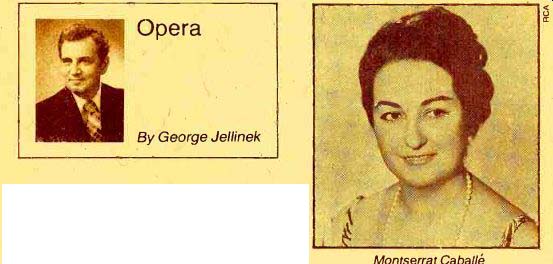
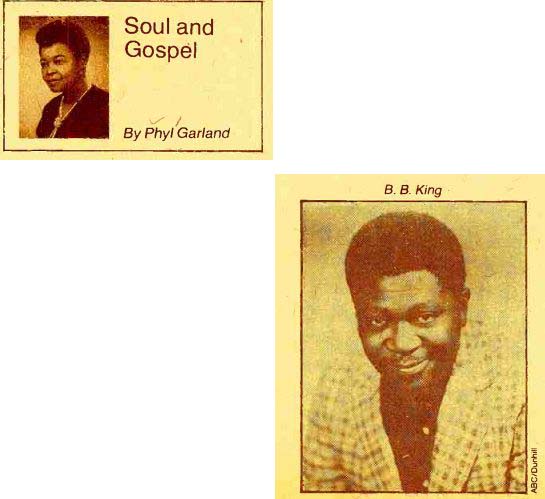
Soul and Gospel
By Phyl Garland
RAY CHARLES: In Person. ATLANTIC 8039. Recorded live in Atlanta in 1959, this album features classic renditions of What'd I Say and Drown in My Own Tears by the art ist most responsible for broadening the scope and appeal of rhythm and blues.
ARETHA FRANKLIN: I Never Loved a Man the Way I Love You. ATLANTIC SD 8139. Recorded in 1967 and featuring such gems as Dr. Feelgood, Respect, and Don't Let Me Lose This Dream, this album marked Aretha's emergence as a major influence on modern popular music, setting the tone for the soul explosion of the Sixties.
MARVIN GAYE: What's Going On. TAMLA TS310. Issued in 1971, this is the finest concept album conceived in the soul-stream; it is remarkable for the consistently high level of music and lyrics and for Gaye's impassioned performance.
THE EDWIN HAWKINS SINGERS: Let Us Go into the House of the Lord. PAVILLION BPS-10001. Dating from the late Six ties, this set shimmers with the youthful vibrance that enabled it to fuse gospel successfully with pop-soul sound; song stand outs are Oh Happy Day, I'm Going Through, and I Heard the Voice of Jesus.
MAHALIA JACKSON: The .World's Greatest Gospel Singer. COLUMBIA CS 8759. She was just what the title says, and this album, marking her debut on a major la bel, represents her art in all its pure religious fervor.
B. B. KING: Live at the Regal. ABC-PARAMOUNT ABC-509.
Issued in 1964, this is the finest recorded example of the King of Urban Blues in live performance (shortly be fore he crossed over into more popular territory), replete with spicy audience response at the old entertainment emporium on Chicago's South Side.
NINA SIMONE: It Is Finished. RCA APL1-0241. Though she is seldom heard from these days, Nina Simone represents all the essential elements of black soul music plus powerful social commentary. This 1974 album, recorded live in Africa, went almost unnoticed, but it stands out as one of her finest.
STEVIE WONDER: Talking Book. TAM-LA T319L. The only competition for this set, which introduced You Are the Sunshine of My Life, You and I, Superstition, and You've Got It Bad Girl, would be Wonder's own equally superb “Innervisions," on TAMLA T326L.
TWO FOR THE FUTURE
STEVIE WONDER: The Next Album. I'd like it--providing it is everything that "Songs in the Key of Life" was intended to be but was not. It might well be built around a concept, possibly tracing his own musical development and carrying it to the higher levels it is eventually bound to reach.
FOUR WOMEN: Aretha Franklin, Nina Simone, Shirley Caesar, and Esther Phillips. Though Nina introduced the idea years ago in a song of this title, I can think of nothing more exciting than an album that would-combine the blues, jazz, soul, and gospel talents of these four artists in a single, no-holds-barred collaboration. More than likely they'd get in each other's way, but it would certainly be different from anything heard to date.
Country By Noel Coppage
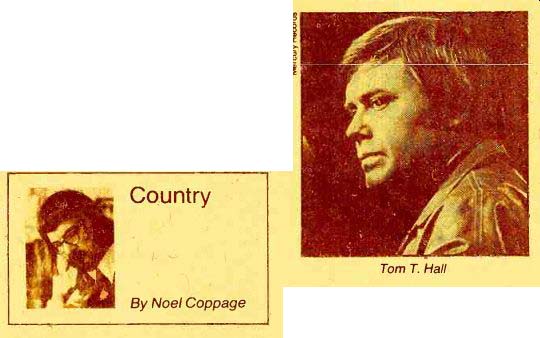
LESTER FLATT AND MAC WISEMAN: Lester 'n' Mac. RCA LSP-4547. Should re ally be called Lester 'n' Mac 'n' Uncle Josh, as Mr. Graves' dobro is a crucial third voice, and you'll seldom hear three personalities and some good songs so well matched.
LEFTY FRIZZELL: Lefty Frizzell Sings the Songs of Jimmie Rodgers. COLUMBIA C 32249. Lefty sang them better than any one but Jimmie himself, and Art Satherley and Don Law fitted him with a neat little ensemble for this one.
TOM T. HALL: in Search of a Song. MERCURY 61350. This is the one that introduced Clayton Delaney (posthumously) and Tom T. Hall's (alive and kicking) enigmatic insight to a lot of folks.
WAYLON JENNINGS: This Time. RCA APL1-0539. Waylon has one of the remarkable voices of our time, and here, for once, the production is consistently good.
BILL MONROE AND HIS BLUE GRASS BOYS: Sixteen Ali-Time Greatest Hits. COLUMBIA CS 1065. From sessions in the Forties (first collected here), this is the definitive bluegrass album with the Boys including Lester Flatt, Earl Scruggs, Mac Wiseman.
Chubby Wise, and Stringbean Akeman.
WILLIE NELSON: Red Headed Stranger. COLUMBIA KC 33482. A story album, a Elisabeth Schwarzkopf
Tom T. Hall mood album, an album not quite like any other-and the story I heard was that Columbia executives were afraid to release it until Waylon Jennings (of RCA) told them how good it was.
NITTY GRITTY DIRT BAND (AND OTHERS): Will the Circle Be Unbroken.
UNITED ARTISTS UAS 9801. A three-disc set full of marvelous stuff by the likes of Doc Watson, Roy Acuff, Maybelle Carter, arid other luminaries.
DOLLY PARTON: Jolene. RCA APL1-0473. Her zenith, so far, bath as a singer and as a songwriter.
TWO FOR THE FUTURE
WAYLON JENNINGS: Waylon Sings Mickey Newbury. Frisco Depot on Waylon's "Ladies Love Outlaws" album suggests what an electrifying combination this could be. It would also insure Jennings of enough truly good songs to fill an entire album, which is the kind of insurance a few other albums indicate he could use.
CONNIE SMITH: Connie Turns Earthy. Maybe she could do a whole string of cheat in' songs picked out by Loretta Lynn. Connie has one of the finest voices in the land (and it's basically an earthy one, or at least a sexy one), but she's had, for years, such a fixation on religion that her albums don't tread the interesting ground.
ELLY AMELING: EM Liederaband. Dalton Baldwin (piano). ELECTROLA C063-02 375. One of today's finest lieder singers per forms (in four languages) favorites from her repertoire, ranging from Scarlatti to Stravinsky and including two' of Erik Satie's cabaret songs.
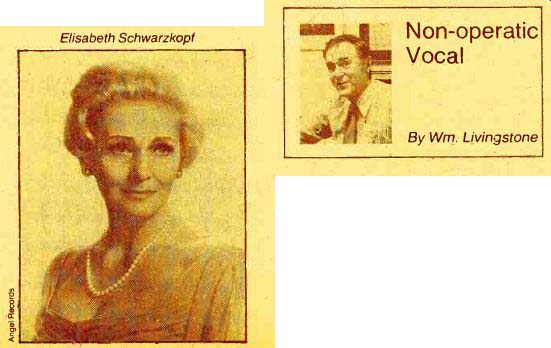
BRAHMS: Deutsche Volkslieder. Elisabeth Schwarzkopf (soprano); Dietrich Fischer-Dieskau (baritone); Gerald Moore (piano)--ANGEL. The The-two most famous members of the post-war generation of German singers teamed to perform folly-two folk-song-settings, alternating solos and joining in duets. The most distinguished accompanist of our time is their collaborator throughout.
MONT'SERRAT CABALLE: Music of Spain. Orquesta Sinfonica de Barcelona, Eugenio Marco cond. LONDON OS 26435. A leading operatic soprano lavishes her sumptuous voice and a great deal of affection on a group of showpieces from the, popular zar zuela repertoire.
VICTORIA DE LOS ANGELES, ALICIA DE LARROCHA: The Concert at Hunter College. ANGEL S-36896. A unique collaboration- of two-of Spain's most distinguished musicians produced, in concert performance, definitive interpretations .of songs by Granados, Fella, and others.
GIUSEPPE DI STEFANO: Melodie Celebri. Orchestra, G. M. Guarino cond. AN GEL S-351337. A dozen of the most beautiful Neapolitan songs are given idiomatic performances here by the possessor of one of the most beautiful tenor voices Italy has produced in this century.
DURUFLE: Requiem. Helene Bouvier (mezzo-soprano); Xavier Depraz (bass); Marie-Madeleine Durufle-Chevalier (organ); Philippe Gaillard and Stephane Caillat Chorales, Orchestre des Concerts Lamoureux, Maurice Durufle cond. EPIC BC 1256. The twentieth century's answer to the Faure Requiem-hoarder, less sentimental, but just as beautiful-in a performance that is, at least for now, unmatchable.
MAHLER: Songs-Album 2. Christa Ludwig (mezzo-soprano); Gerald Moore (piano). SERAPHIM S-60070. Christa Ludwig's musical intelligence and ample interpretive gifts are beautifully displayed in a dozen Mahler songs; a wonderful match of artist and repertoire.
R. STRAUSS: Four Last Songs. Gundula Janowitz (soprano); Berlin Philharmonic, Herbert von Karajan cond. DEUTSCHE GRAMMOPHON 2530 368. The pure, almost instrumental quality of Janowitz's voice and her unmannered interpretations suit Strauss' last vocal works perfectly.
TWO FOR THE FUTURE RENATA SCOTTO: Favorite Songs by Francesco Paolo Tosti. Few Italian opera singers are such skilled recitalists as Miss Scotto. I once heard her sing Tosti's 'A Vucchella so beautifully that I have longed to hear her perform more of this composer's work.
REGINE CRESPIN: Cabaret Songs. Mme. Crespin's joie de vivre has made her forays into operetta so successful that I wonder if she might not go one step further in the direction of light music.
Concerted Music By James Good friend
BRAHMS: Piano Concerto No. 2, in B-flat Major. Emil Gilels (piano); Chicago Symphony Orchestra, Fritz Reiner cond. RCA VICS-1026. I've compared it with all recordings since, and, though the competition is sometimes close, they always lose.
HINDEMITH: Die . Sieben Kammer musiken: Op. 24, No. 1; Op. 36, Nos. 1-4; Op. 46, Nos. 1 and 2. Soloists; Concerto Amsterdam. TELEFUNKEN 36.35008. Hindemith's "Brandenburg Concertos" are among the real treasures of twentieth-century music, and they have rarely, if ever, been better performed and recorded than here.
MOZART: Piano Concertos Nos. 14-19 (K. 449, 450, 451, 453, 456, and 459). Peter Serkin (piano); English Chamber Orchestra, Alexander Schneider cond. RCA ARL3-0732. Schneider's warmth and Serkin's "coolth" strike magic from these less than overplayed Mozart masterpieces.
MOZART: Sinfonia Concertante in E-flat Major (K. 364); Exsultate Jubilate (K. 165). Rafael Druian (violin); Abraham Sker nick (viola); Judith Raskin (soprano, in Ex sultate); Cleveland Orchestra, George Szell cond. COLUMBIA MS-6625. All in all, this was probably Szell's best record, with elegant playing (and singing) and simply magnificent teamwork.
POULENC: Concerto in G Minor for Organ, Strings, and Timpani; Gloria in G Major. Maurice Durufle (organ); French National Radio Orchestra and Chorus, George Pretre cond. ANGEL S-35953. The best and most representative record of the serious side of a great tragicomic composer.
RACHMANINOFF: Piano Concerto No. 3, in D Minor, Op. 30. Yevgeny Mogilevsky (piano); Moscow Philharmonic Symphony Orchestra, Kiril Kondrashin cond. MELODIYA/ANGEL S-40226. Pianistically and musically the most satisfying Rachmaninoff Third on record.
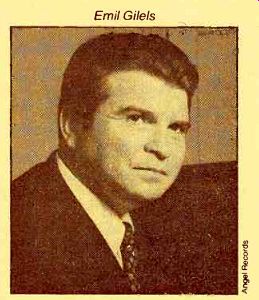
Emil Gilels
RAVEL: Piano Concerto in G Major.
RACHMANINOFF: Piano Concerto No. 4, in G Minor, Op. 40. Arturo Benedetti Michelangeli (piano); Philharmonia Orchestra, Ettore Gracis cond. ANGEL S-35567. Primarily for the Ravel: one of the pianistic magicians of our time in a performance that al most defies comparison.
RODRIGO: Concierto de Aranjuez; Fantasia pare un Gentilhombre. Narciso Yepes (guitar); Orquesta Nacional de Es pana, Ataulfo Argenta cond. LONDON STS-15199. The original recording, and, for me, still the best, of the Concierto, here coupled with its companion piece.
TWO FOR THE FUTURE
NYSTROEM: Piano Concerto. Tedd Joselson (piano); Boston Symphony Orchestra, Ulf Bjorlin cond. An outstanding piano concerto of this century, in the Prokofiev tradition and all but unknown on this side of the Atlantic, could get a devastating performance from these forces.
CHAUSSON: Concert for Violin, Piano, and String Quartet. Itzhak Perlman (violin); Martha Argerich (piano); Alban Berg Quartet. A lush Romantic masterpiece will get its due only from a group of the lushest, most romantic performers.
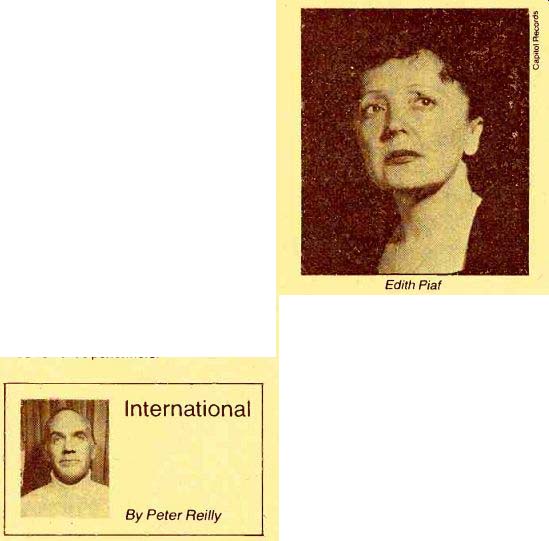
ROBERTO CARLOS: In Portuguese. CAYTRONICS CYS 1366. The most export able representative of the fertile world of Brazilian popular music, Carlos sings in his native Portuguese on this album, which includes several of his best songs.
MARLENE DIETRICH: Marlene. CAPI TOL ST-10397. The legend herself, proving why it's all true in a collection of songs sung in German.
GREECE TODAY. PHILIPS PHS 600-094. There are eleven songs and eight singers on this stereo disc compiled from Greek monophonic records, and not one of them is less than a winner.
NATI MISTRAL: Transcendencia Universal y Madrileria de Nati Mistral. ALHAM BRA C7004. The Spanish singing actress Nati Mistral is the Maria Callas of the cancion, and this album gives a good idea of her musical and emotional range.
EDITH PIAF: Olympia Recital, 1961. PATHE (Peters International) C062 15304. Piaf's appearances at the Olympia in Paris were close to state occasions, and this sample of the greatest actress-singer of her time, alternately exalting and wringing her listeners dry, was a classic recording even upon first release.
CUCO SANCHEZ: Guitarras A Media Noche. CAYTRONICS CYS 1071. The Mexican singer-songwriter Cuco Sanchez is presented at his best in this group of mostly sad songs performed in his very emotional manner with guitar and harp accompaniment.
Edith Piaf
ELISABETH SCHWARZKOPF: Sings Operetta. ANGEL S-35696. The most ravishing beauty of the operatic stage-vocally and visually-singing bits of Viennese fluff so definitively (her magical soaring in The Nuns' Chorus is absolutely unforgettable, her languid sexiness in Im Chambre Separee palm-moistening) that they need never be recorded again.
THE UMBRELLAS OF CHERBOURG. PHILIPS 616. Michel Legrand's score for Jacques Demy's operetta-film remains his finest achievement, music of such spring like tenderness and sweetness that even without Catherine Deneuve's drop-dead beauty, I still get a gloriously queasy feeling whenever I hear the main theme.
TWO FOR THE FUTURE
MONTSERRAT CABALLE: Caballe Sings Ernesto Lecuona. Lecuona's en chanting music has always gotten some thing of a brush-off from American recording companies, and I can't think of anything I'd enjoy more than hearing the luscious Cabate voice wrapped around such bonbons as Maria la 0 or Siboney accompanied by a full orchestra with, perhaps, Fruhbeck de Burgos or Bernstein conducting-but I'd even settle for piano accompaniment (Jorge Bolet, of course).
GISELA MAY: Gems from the Greta Keller Songbook. I would ask the extremely gifted Miss May to put aside for once the rather grim repertoire she specializes in and record a few dozen of the songs of Gershwin, Porter, Coward, and Rodgers and Hart that formed the core of the large repertoire of the late, great Viennese cabaret singer Greta Keller.
Also see:
Source: Stereo Review (USA magazine)